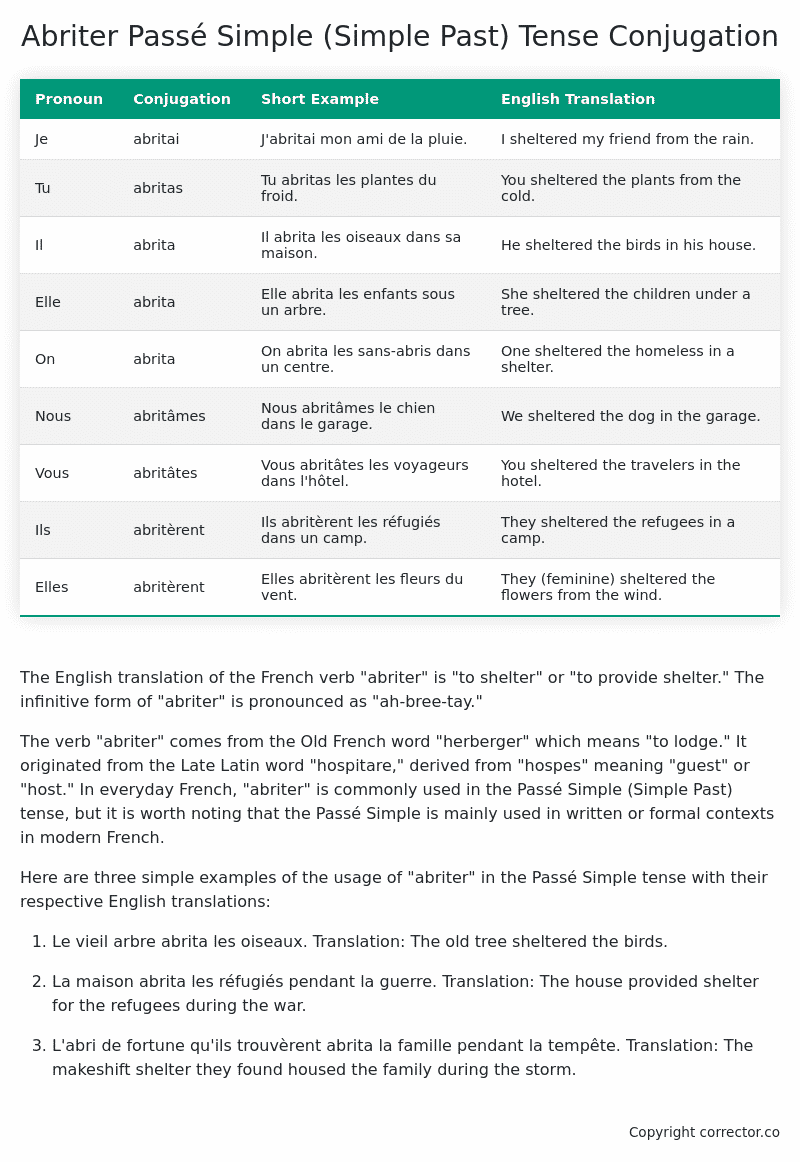Passé Simple (Simple Past) Tense Conjugation of the French Verb abriter
Introduction to the verb abriter
The English translation of the French verb “abriter” is “to shelter” or “to provide shelter.” The infinitive form of “abriter” is pronounced as “ah-bree-tay.”
The verb “abriter” comes from the Old French word “herberger” which means “to lodge.” It originated from the Late Latin word “hospitare,” derived from “hospes” meaning “guest” or “host.” In everyday French, “abriter” is commonly used in the Passé Simple (Simple Past) tense, but it is worth noting that the Passé Simple is mainly used in written or formal contexts in modern French.
Here are three simple examples of the usage of “abriter” in the Passé Simple tense with their respective English translations:
-
Le vieil arbre abrita les oiseaux.
Translation: The old tree sheltered the birds. -
La maison abrita les réfugiés pendant la guerre.
Translation: The house provided shelter for the refugees during the war. -
L’abri de fortune qu’ils trouvèrent abrita la famille pendant la tempête.
Translation: The makeshift shelter they found housed the family during the storm.
Table of the Passé Simple (Simple Past) Tense Conjugation of abriter
| Pronoun | Conjugation | Short Example | English Translation |
|---|---|---|---|
| Je | abritai | J’abritai mon ami de la pluie. | I sheltered my friend from the rain. |
| Tu | abritas | Tu abritas les plantes du froid. | You sheltered the plants from the cold. |
| Il | abrita | Il abrita les oiseaux dans sa maison. | He sheltered the birds in his house. |
| Elle | abrita | Elle abrita les enfants sous un arbre. | She sheltered the children under a tree. |
| On | abrita | On abrita les sans-abris dans un centre. | One sheltered the homeless in a shelter. |
| Nous | abritâmes | Nous abritâmes le chien dans le garage. | We sheltered the dog in the garage. |
| Vous | abritâtes | Vous abritâtes les voyageurs dans l’hôtel. | You sheltered the travelers in the hotel. |
| Ils | abritèrent | Ils abritèrent les réfugiés dans un camp. | They sheltered the refugees in a camp. |
| Elles | abritèrent | Elles abritèrent les fleurs du vent. | They (feminine) sheltered the flowers from the wind. |
Other Conjugations for Abriter.
Le Present (Present Tense) Conjugation of the French Verb abriter
Imparfait (Imperfect) Tense Conjugation of the French Verb abriter
Passé Simple (Simple Past) Tense Conjugation of the French Verb abriter (You’re reading it right now!)
Passé Composé (Present Perfect) Tense Conjugation of the French Verb abriter
Futur Simple (Simple Future) Tense Conjugation of the French Verb abriter
Futur Proche (Near Future) Tense Conjugation of the French Verb abriter
Plus-que-parfait (Pluperfect) Tense Conjugation of the French Verb abriter
Passé Antérieur (Past Anterior) Tense Conjugation of the French Verb abriter
Futur Antérieur (Future Anterior) Tense Conjugation of the French Verb abriter
Subjonctif Présent (Subjunctive Present) Tense Conjugation of the French Verb abriter
Subjonctif Passé (Subjunctive Past) Tense Conjugation of the French Verb abriter
Subjonctif Imparfait (Subjunctive Imperfect) Tense Conjugation of the French Verb abriter
Subjonctif Plus-que-parfait (Subjunctive Pluperfect) Tense Conjugation of the French Verb abriter
Conditionnel Présent (Conditional Present) Tense Conjugation of the French Verb abriter
Conditionnel Passé (Conditional Past) Tense Conjugation of the French Verb abriter
Conditionnel Passé II (Conditional Past II) Tense Conjugation of the French Verb abriter
L’impératif Présent (Imperative Present) Tense Conjugation of the French Verb abriter
L’impératif Passé (Imperative Past) Tense Conjugation of the French Verb abriter
L’infinitif Présent (Infinitive Present) Tense Conjugation of the French Verb abriter
L’infinitif Passé (Infinitive Past) Tense Conjugation of the French Verb abriter
Le Participe Présent (Present Participle) Tense Conjugation of the French Verb abriter
Le Participe Passé (Past Participle) Tense Conjugation of the French Verb abriter
Struggling with French verbs or the language in general? Why not use our free French Grammar Checker – no registration required!
Get a FREE Download Study Sheet of this Conjugation 🔥
Simply right click the image below, click “save image” and get your free reference for the abriter Passé Simple tense conjugation!

Abriter – About the French Passé Simple (Simple Past) Tense
Formation
Usage
Narration
Historical Context
Interactions with other tenses
Passé Composé
Imparfait
Conditional and Subjunctive
Summary
I hope you enjoyed this article on the verb abriter. Still in a learning mood? Check out another TOTALLY random French verb conjugation!


